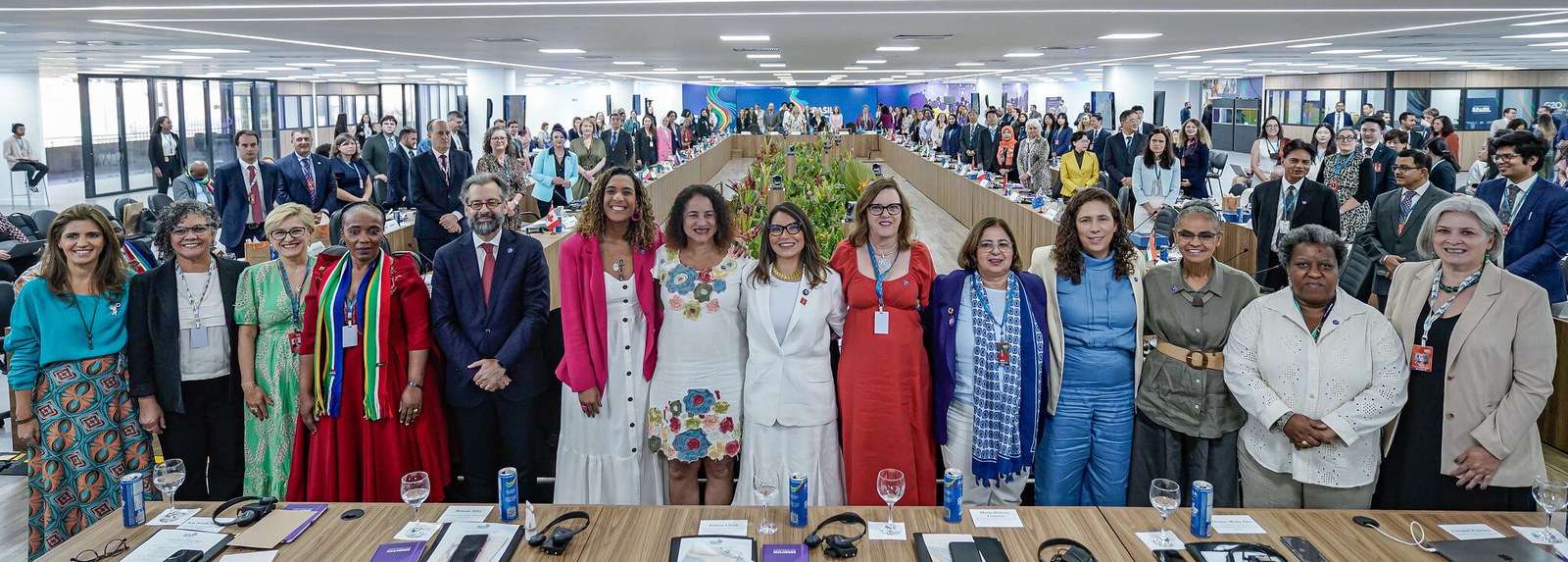G20 holds the first Empowerment of Women ministerial meeting in the Forum's history
This unprecedented event lays the foundations for actions to promote gender equality, which will continue during South Africa's G20 presidency in 2025. Proposals include policies to tackle violence against women, the insertion of women in the digital economy, and the creation of a global care policy.

Marking a historic moment in the global effort for gender equality, the G20 meeting brought together leaders from the member countries and Brazilian ministers involved in the agendas of gender equality and empowerment of women. On Friday, October 11th, the first ever ministerial meeting of the Empowerment of Women WG took place in Brasília. At the opening, the South African delegation ensured that the Working Group will continue during their presidency in 2025.
The Minister of Women, Cida Gonçalves, opened the meeting by highlighting the importance of this achievement and the participation of several Brazilian female ministers and the first lady of Brasil, Janja da Silva. The meeting was attended by ministers Esther Dweck (Management and Innovation), Luciana Santos (Science and Technology), Marina Silva (Environment), Anielle Franco (Racial Equality) and Macaé Evaristo (Human Rights and Citizenship). Cida emphasized that "this meeting marks an intense year of constructions, dialogues and negotiations on gender equality and the empowerment of women with the largest and most important economies in the world".
Throughout 2024, technical teams met to discuss fundamental topics such as the economic and social development of women, resulting in concrete commitments to make gender equality a priority. "In this G20 space we seek commitments that put women at the heart of our countries' economic growth and development strategies that open the doors of science and technology to girls and young people," said Cida Gonçalves.
The minister spoke of the urgency of breaking down the barriers that prevent women from reaching high positions, such as gender-based violence, misogyny, and discrimination in the labor market. "It is not enough to talk about opportunities if we do not face the barriers that prevent women from reaching them," said Cida, stressing that female empowerment needs to include all women, especially the most marginalized.
Some advances achieved throughout 2024 were highlighted during the meeting. Gender equality was included on the agendas of various G20 working groups, such as the Employment WG, which recognized the Care Economy as a vital topic for promoting women's autonomy, and the Energy Transitions WG, which brought forward the disproportionate impact of energy poverty on women.
Some advances achieved throughout 2024 were highlighted during the meeting. Gender equality was included on the agendas of various G20 working groups, such as the Employment WG, which recognized the Care Economy as a vital topic for promoting women's autonomy, and the Energy Transitions WG, which brought forward the disproportionate impact of energy poverty on women.
The minister also reinforced that "the G20 has the opportunity to lead," showing the world that it is possible to build strong and fair economies with gender equality at the center of public policies. She mentioned that the negotiations led to the creation of a document that represents "a significant advance," the result of a process of intense diplomacy and international cooperation.
Impact of climate change on women's lives
Another highlight was the discussion on the central role women play in climate issues. Cida Gonçalves noted that "it is not enough to recognize that women are the most affected by climate change. We need to place them at the center of the solutions to the climate crisis". Climate action with a gender perspective was highlighted as one of the priorities, recognizing that women are fundamental in adapting to and mitigating environmental impacts.
During the meeting, Brasil's first lady, sociologist Janja Lula, highlighted the country's commitment to the women's agenda but believes that “unfortunately we still have a long way to go, especially for the implementation of gender equality”. Janja stressed the importance of ensuring that gender equality agendas are part of global public policies.
“Accessing sufficient quality food for their nutrition, work, and income to support their families is the most essential human condition for women and girls to be able to access their other rights and overcome their exclusion. It is unacceptable that we have global GDP in the trillions, but that thousands of girls and women still have to walk kilometers to get water, food and still cook with firewood, coal and kerosene, especially in the Global South”.
“Accessing sufficient quality food for their nutrition, work, and income to support their families is the most essential human condition for women and girls to be able to access their other rights and overcome their exclusion. It is unacceptable that we have global GDP in the trillions, but that thousands of girls and women still have to walk kilometers to get water, food and still cook with firewood, coal and kerosene, especially in the Global South”.
The creation of the Global Alliance Against Hunger and Poverty was pointed out as an important tool to reduce inequalities that mainly affect women worldwide. Cida Gonçalves gave a message of hope and commitment: "Gender equality is a condition for sustainable and economic development. We have reason to be hopeful. The road ahead is challenging, but the commitment shown by G20 members gives us the strength to continue".